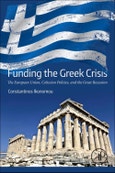How does one distinguish between European Union investments that improve welfare and those that create economic malaise? Funding the Greek Crisis: The European Union, Cohesion Policies, and the Great Recession explores the sources of the Greek Crisis that lie primarily in EU policies that appeared to have worked better for other countries but not for Greece. Without overly simplifying the Greek condition, it provides insights into policies the countries of the euro area may need to implement in order to ensure collective cohesion and individual success. Arguing that EU preferences for autonomous investments discouraged organic development with lasting implications, Funding the Greek Crisis sheds new light on the nature of regional competitiveness and public economics.
Please Note: This is an On Demand product, delivery may take up to 11 working days after payment has been received.
Table of Contents
1. The Great Greek Crisis 2. Theoretical Underpinnings 3. Analysis of the Deeper Causes of the Greek Crisis 4. Conclusions








